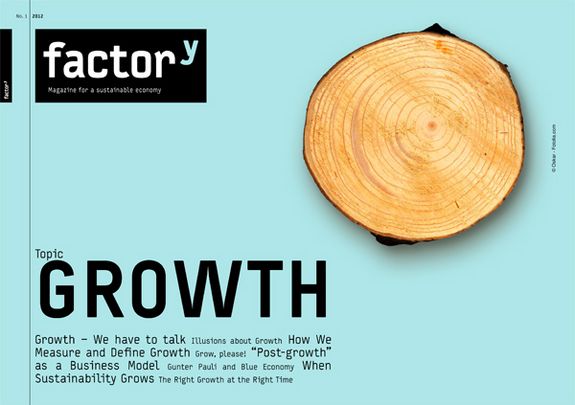Growth

„How we treat Growth ...“
Citations to Growth, compiled by Bert Beyers, translated from the German by Alina Junk
The unprecedented orgy of growth regarding the history of mankind that has occurred over the last few decades has put the population of the first industrialised countries in a state of intoxication, and where they choose to remain. They fear the disillusionment, the hangover. Therefore, they try to maintain or even to slightly increase their state of intoxication with stimulants such as monetary delusions, public and private debt or the like. According to the consensus view, human beings are only satisfied and the public good only works in a state of intoxication.
Meinhard Miegel, German political scientist
Based on Miegel, Meinhard: Exit – Wohlstand ohne Wachstum. Berlin 2010, p.163
Growth can solve some problems, but in doing so, it causes others… The earth is finite. Physical growth, including the human population, their vehicles, homes, and factories cannot go on forever.
However, the limits of growth are not limits to the number of people, their vehicles, homes, factories – at least not directly. They are limits of performance – the steady flow of energy and material, in order to keep people, vehicles, homes and factories in operation. They are limits of the rate at which humanity harvests resources (crops, grass, wood, fish) and emits waste (greenhouse gases, toxic substances), without enlarging the planet’s capacities correspondingly.”
Dennis Meadows and Donella Meadows, Jørgen Randers
Meadows, Donella; Randers, Jørgen; Meadows, Dennis: Limits to Growth, The 30-Year Update, White River Junction, 2004, S. 8f
Growth means an increase in quantity of a physical product. 'Development' means an improvement in quality in the use of a given flow that either results from better technological knowledge or a better understanding of the product’s purposes.
This is why an economy, which is in a stationary state as a subsystem of planet earth, can develop but does not grow – just as our planet can develop without growing.
The notion that we can save the paradigm of growth by dematerialising our economy, or “decoupling” it from resources, or substituting information for resources, is pure imagination. We can surely eat lower on the food chain, but we cannot eat recipes!
Based loosely on Herman E. Daly
Daly, Herman E.: Beyond Growth: The Economics of Sustainable Development. Beacon Press, 1996
Our investments are geared towards working expansively on consumer markets. Exciting new products find the perfect opponent in us, the consumer – simply because we love new things.
In our everyday lives, we get caught up in our own consumer patterns. We use material things like a language to communicate how important we are, how much we love each other, and where we stand in society. We use these things to make our own identity stronger, to document that we are socially embedded, and they have real meaning in our lives. That is where the dilemma lies. And this is also where we are rooted in the economic structures; it is somewhat like social logic.
Tim Jackson
In a keynote speech held on April 6, 2011 at the Heinrich Böll Foundation, Berlin
The end of economic growth is pure fiction. We are rather in the middle of a gigantic cycle of growth that will last for the next few decades.
(...) While we discuss the limits to growth, the people in Asia, Latin America and Africa have set out to realise their dreams of a better life – modern apartments, substantial food, television, computer and telephone, fashionable clothes, individual mobility and trips to foreign countries. Nothing and no one will stop them. Only the question remains whether this enormous boost of new goods and services will lead to ecological collapse or whether it can be controlled in a sustainable way.
Ralf Fücks
Fücks, Ralf: Das Wachstum der Grenzen (The limits to growth). In: Das Magazin der Heinrich-Böll-Stiftung, issue 2, 2011
The key question is: Can we implement this technically?
Can we optimise the use of resources and energy to such an extent that we will overcompensate the expected growth and thus reduce our overall environmental impact - or will this efficiency revolution, as we call it at our institute in Wuppertal, not be sufficient on its own? This topic is being discussed quite controversially, even at our institute. I am sceptical whether technological innovations alone will suffice to bring about an efficiency revolution. Therefore it is crucial to identify ways which can combine the needed technological progress with redefined concepts of civilisation and wealth in order to assess their potential.
Uwe Schneidewind, President of Wuppertal Institute
During an interview with Faktor X
The greatest obstacle to changing one's lifestyle is a substitute religion underpinned by technology, according to which a disconnection of the traditional link between economic growth and the consumption of natural resources is possible.
When the media, politicians, and other multipliers of social life inculcate us with the credo that the next industrial revolution, the Green New Deal, or another dematerialisation is just around the corner, thus letting the chalice of a change in lifestyles pass from us once more, nobody has a reason to give up ecologically disastrous practices, since the responsibility lies with the progress in disconnecting the link between economic growth and the consumption of natural resources.”
In an Interview with Faktor X
From today‘s point of view, Ludwig Erhard‘s campaign slogan from 1957 calling for "wealth for everybody" would have to be broadened to "well-being for everybody".
This broadened concept of wealth includes not only material goods but also social aspects like the quality of life and satisfaction of the population.
Horst W. Opaschofski
Opaschofski, Horst W.: Wohlergehen für alle (well-being for everybody). Hamburger Abendblatt, 12.10.2011
News zum Thema
- 10/2016 | European Resources Forum (ERF) on 9 – 10 November 2016
- 10/2016 | Environmental tax reform for climate protection and social justice
- 07/2016 | Planetary Urbanism – The Transformative Power of Cities in 50 Selected Works
- 11/2015 | The Hope for COP
- 10/2015 | If a major economy takes the lead, warming could be limited to 2°C
- 06/2014 | 2013 is another Record Year for Renewables
- 05/2014 | "Growth" issue now available
- 10/2013 | Germany could be greenhouse-gas-neutral by 2050
- 01/2013 | For a Better Energy Efficiency Policy
- 01/2013 | A New Way of Assessing our Economies: The Prosperity Quintet
Themen
- The Domino Effect: the Mobility Transition as an Engine for the ‘Great Transformation’
- Cities Use the Space
- Decarbonization by 2030
- The fear of biting the hand that feeds you
- Where investing is a pleasure
- Why divestment is going to change the world
- A Robin Hood tax for climate protection
- May the Force Be with Us
- Modern Strategies
- The prerogative of interpreting the future now lies with the companies involved in climate protection”
- From Negotiating to Trading Equitably
- Can a donkey be tragic?
- Rethink rather than rebound: a sufficiency revolution must precede the efficiency revolution
- On Rebound, Prebound and Performance Gaps
- So Let Us Seize Power Then!
- With Common Property Against Political Failure
- So Let Us Seize Power Then!
- The Comforting Beauty of Failure
- “It Is Not Impossible at All.“
- Resource-light shopping
- Men Have Not Stopped Giving the Advantage to Women – So Far
- Toothpaste for Princesses and Soup for Pirates
- It is about equality
- A nice day
- Initiative instead of frustration
- The right ingredients
- Resilient for Life
- Not only, but also
- Appreciation – more please!
- Worth more than money
- Learning to value the value of goods
- Worth and Values
- The Transformative Power of Science
- Historically effective: How innovation and technology transform
- The Disappearance of Products
- Growing Older 101
- Columbus’ Egg
- It Works! In Theory at Least ...
- What If...?
- Analysing Separately – Thinking and Acting Together!
- Let’s Break Away from Determined Breaking Points
- More Gold in Waste than in Mines
- The art of separation
- Should you really DIY?
- The Aesthetics of Do-It-Yourself
- Standing on One’s Own Feet
- From the handaxe to desktop fabrication
- Using Shares to Survive the Crisis
- When Citizens participate
- Possess to Participate
- The Right Growth at the Right Time
- Gunter Pauli and Blue Economy
- When Sustainability Grows
- How we treat Growth
- Illusions about Growth


